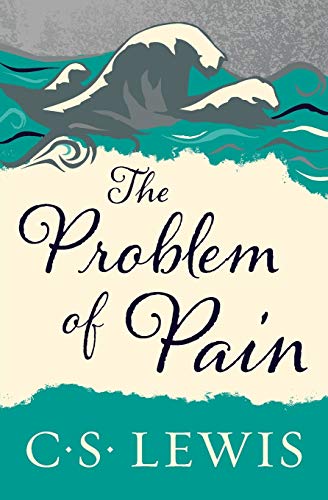
Quotes by C.S. Lewis
If God were good, He would wish to make His creatures perfectly happy, and if He were almighty, He would be free to do what He wished. But His creatures are not happy. Therefore, God lacks either goodness, or power, or both. This is the problem of pain in its simplest form.
Don’t let your happiness depend on something you may lose.
No man knows how bad he is till he has tried very hard to be good. A silly idea is current that good people do not know what temptation means. This is an obvious lie. Only those who try to resist temptation know how strong it is. After all, you find out the strength of the German army by fighting it, not by giving in. A man who gives in to temptation after five minutes simply does not know what it would have been like an hour later. That is why bad people, in one sense, know very little about badness. They have lived a sheltered life by always giving in. We never find out the strength of the evil impulse inside us until we try to fight it.
Christ, because He was the only Man who never yielded to temptation, is also the only Man who knows to the full what temptation means.
Affection is responsible for nine-tenths of whatever solid and durable happiness there is in our lives.
To love at all is to be vulnerable. Love anything, and your heart will certainly be wrung and possibly be broken. If you want to make sure of keeping it intact, you must give your heart to no one, not even to an animal. Wrap it carefully round with hobbies and little luxuries; avoid all entanglements; lock it up safe in the casket or coffin or your selfishness. But in that casket—safe, dark, motionless, airless—it will change. It will not be broken; it will become unbreakable, impenetrable, irredeemable…The only place outside Heaven where you can be perfectly safe from all the dangers…of love is Hell.
The perfect church service would be one we were almost unaware of; our attention would have been on God.
The enemy will not see you vanish into God’s company without an effort to reclaim you.
We want, in fact, not so much a father in heaven as a grandfather in heaven: a senile benevolence who, as they say, “liked to see young people enjoying themselves” and whose plan for the universe was simply that it might be truly said at the end of each day, “a good time was had by all.”
He who has God and everything else has no more than he who has God only.
A man who was merely a man and said the sort of things Jesus said would not be a great moral teacher. He would either be a lunatic – on a level with the man who says he is a poached egg – or else the Devil of Hell. You must make your choice. Either this man was, and is, the Son of God: or else a madman or something worse. You can shut him up for a fool, you can spit at him and kill him as a demon, or you can fall at his feet and call him Lord and God. But let us not come with any patronizing nonsense about his being a great moral teacher. He has not left that open to us. He did not intend to.
We must lay before Him what is in us, not what ought to be within us.
Christianity, if false, is of no importance, and if true, of infinite importance. The only thing it cannot be is moderately important.
In Scripture the visitation of an angel is always alarming; it has to begin by saying “Fear not.” The Victorian angel looks as if it were going to say, “There, there.”
Once a man is united to God, how could he not live forever?
The central miracle asserted by Christians is the incarnation. They say that God became man.
Non-Christians seem to think that the Incarnation implies some particular merit or excellence in humanity. But of course it implies just the reverse: a particular demerit and depravity. No creature that deserved Redemption would need to be redeemed. They that are whole need not the physician. Christ died for men precisely because men are not worth dying for; to make them worth it.
The Christians who did most for the present world were precisely those who thought most of the next. It is since Christians have begun thinking less of the other world that they have become so ineffective in this. Aim at heaven and you get earth thrown in; aim at earth and you get neither.
If we really think that home is elsewhere and that this life is a “wandering to find home,” why should we not look forward to the arrival?
Aim at heaven and you will get earth thrown in. Aim at earth and you will get neither.
A continual looking forward to the eternal world is not a form of escapism or wishful thinking, but one of the things a Christian is meant to do.
Any fool can write learned language. The vernacular is the real test. If you can’t turn your faith into it, then you either don’t understand it or you don’t believe it.
Of course one must take “sent to try us” the right way. God has not been trying an experiment on my faith or love in order to find out their quality. He knew it already. It was I who didn’t.
There are two kinds of people: those who say to God, “Thy will be done,” and those to whom God says, “All right, then, have it your way.”
I do not believe one can settle how much we ought to give. I am afraid the only safe rule is to give more than we can spare.
[The flesh] knows that if the spiritual life gets hold of it, all its self-centeredness and self-will are going to be killed and it is ready to fight tooth and nail to avoid that.
It is not your business to succeed, but to do right: when you have done so, the rest lies with God.
God cannot give us happiness and peace apart from Himself, because it is not there. There is no such thing.
But the most obvious fact about praise – whether of God or anything – strangely escaped me. I thought of it in terms of compliment, approval, or the giving of honor. I had never noticed that all enjoyment spontaneously overflows into praise…The world rings with praise – lovers praising their mistresses, readers their favorite poet, walkers praising the countryside, players praising their favorite game… My whole, more general, difficulty about the praise of God depended on my absurdly denying to us, as regards the supremely Valuable, what we delight to do, what indeed we can’t help doing, about everything else we value. I think we delight to praise what we enjoy because the praise not merely expresses but completes the enjoyment; it is the appointed consummation.
It is only when you are asked to believe in Reason coming from non-reason that you must cry Halt. Human minds. They do not come from nowhere.
An individual Christian may see fit to give up all sorts of things for special reasons – marriage, or meat, or beer, or cinema; but the moment he stars saying the things are bad in themselves, or looking down his nose at other people who do use them, he has taken the wrong turning.
I believe in Christianity as I believe that the sun has risen, not only because I see it but because, by it, I see everything else.
I know that many wiser and better Christians than I in these days do not like to mention heaven and hell even in a pulpit. I know, too, that nearly all the references to this subject in the New Testament come from a single source. But then that source is Our Lord Himself… These overwhelming doctrines…are not really removable from the teaching of Christ or of His Church. If we do not believe them our presence in this church is great tomfoolery. If we do, we must sometime overcome our spiritual prudery and mention them.
You never know how much you really believe anything until its truth or falsehood becomes a matter of life and death to you.
[He] is not proud… He will have us even though we have shown that we prefer everything else to Him.
[Christ] wants a child’s heart, but a grown-up’s head. He wants us to be simple, single-minded, affectionate, and teachable, as good children are; but He also wants every bit of intelligence we have to be alert at its job, and in first-class fighting trim.
But pain insists upon being attended to. God whispers to us in our pleasures, speaks in our conscience, but shouts in our pains: It is His megaphone to rouse a deaf world.
Creatures are not born with desires unless satisfaction for those desires exists. A baby feels hunger: well, there is such a thing as food. A duckling wants to swim: well, there is such a thing as water…. If I find in myself a desire which no experience in this world can satisfy, the most probable explanation is that I was made for another world. If none of my earthly pleasures satisfy it, that does not prove that the universe is a fraud. Probably, earthly pleasures were never meant to satisfy it, but only to arouse it, to suggest the real thing.
The glory of God, and, as our only means to glorifying Him, the salvation of human souls, is the real business of life.
The present is the only time in which any duty may be done or grace received.
If you do not listen to theology, that will not mean you have no ideas about God, rather it will mean you have a lot of wrong ones.
Theology is practical, especially now… If you do not listen to Theology that will not mean that you have no ideas about God. It will mean that you have a lot of wrong ones – bad, muddled, out-of-date ideas.
The words “God is love” have no real meaning unless God contains at least two Persons. Love is something that one person has for another person. If God was a single person then before the world was made, He was not love.
In some way, it is natural for us to wish that God had designed for us a less glorious and less arduous destiny; but then we are wishing not for more love but for less.
Atheists express their rage against God although in their view He does not exist.
An “impersonal God” – well and good. A subjective God of beauty, truth and goodness, inside our own head – better still. A formless life-force surging through us, a vast power which we can tap – best of all. But God Himself, alive, pulling at the other end of the cord, perhaps, approaching an infinite speed, the hunter, king, husband – that is quite another matter. There comes a moment when the children who have been playing at burglars hush suddenly: Was that a real footstep in the hall? There comes a moment when people who have been dabbling in religion (“Man’s search for God!”) suddenly draw back. Supposing we really found Him? We never meant it to come to that! Worse still, supposing He had found us?
There are two equal and opposite errors into which our race can fall about the devils. One is to disbelieve in their existence. The other is to believe, and to feel an excessive and unhealthy interest in them. They themselves are equally pleased by both errors, and hail a materialist and a magician with the same delight.
In the Trinity Term of 1929, I gave in and admitted that God was God and knelt and prayed.
To ask that God’s love should be content with us as we are is to ask that God should cease to be God.
It is when we notice the dirt that God is most present in us.
We have a strange illusion that mere time cancels sin. But mere time does nothing either to the fact or to the guilt of a sin.
I think we delight to praise what we enjoy because the praise not merely expresses but completes the enjoyment; it is its appointed consummation. If it were possible for a created soul fully to “appreciate,” that is, to love and delight in, the worthiest object of all, and simultaneously at every moment to give this delight perfect expression, then that soul would be in supreme blessedness. To praise God fully we must suppose ourselves to be in perfect love with God, drowned in, dissolved by that delight which, far from remaining pent up within ourselves as incommunicable bliss, flows out from us incessantly again in effortless and perfect expression. Our joy is no more separable from the praise in which it liberates and utters itself than the brightness a mirror receives is separable from the brightness it sheds.
It is in the process of being worshipped that God communicates His presence to men.
We find thus by experience that there is no good applying to heaven for earthly comfort. Heaven can give heavenly comfort; no other kind. Earth cannot give earthly comfort either, as there is no earthly comfort in the long run.
Even if all the things that people prayed for happened – which they do not – this would not prove what Christians mean by the efficacy of prayer. For prayer is request. The essence of request, as distinct from compulsion, is that it may or may not be granted. And if an infinitely wise Being listens to the requests of finite and foolish creatures, of course He will sometimes grant and sometimes refuse them. Invariable "success" in prayer would not prove the Christian doctrine at all. It would prove something more like magic – a power in certain human beings to control, or compel, the course of nature.
Evil is often the perversion of something good that God has created.
Evil is a parasite. It is there only because good is there for it to spoil and confuse.
Look for yourself and you will find in the long run only hatred, loneliness, despair, rage, ruin and decay. But look for Christ and you will find Him, and with Him everything else thrown in.
It was through Pride that the devil became the devil: Pride leads to every other vice: it is the completely anti-God state of mind.
There are only two kinds of people in the end: those who say to God, “Thy will be done,” and those to whom God says, in the end, “Thy will be done.” All that are in hell choose it. Without that self-choice there could be no hell. No soul that seriously and constantly desires joy will ever miss it. Those who seek find. To those who knock it will be opened.
When you come to knowing God, the initiative lies on His side. If He does not show Himself, nothing you can do will enable you to find Him.
Apologetic work is so dangerous to one’s faith. A doctrine never seems dimmer to me than when I have just successfully defended it.
We ought to give thanks for all fortune: if it is good, because it is good, if bad, because it works in us patience, humility and the contempt of this world and the hope of our eternal country.
Courage is not simply one of the virtues, but the form of every virtue at the testing point.
There is no use trying to be more spiritual than God. God never meant man to be a purely spiritual creature. That is why He uses material things like bread and wine to put the new life into us. We may think this rather crude and unspiritual. God does not: He invented eating. He likes matter. He invented it. I know some muddle-headed Christians have talked as if Christianity taught that sex, or the body, or pleasure, were bad in themselves. But they were wrong. Christianity is almost the only one of the great religions which thoroughly approves of the body – which believes that matter is good, that God Himself once took on a human body, and that some kind of body is going to be given to us even in Heaven and is going to be an essential part of our happiness, our beauty, and our energy.
Quoted in: Sam Storms, Introduction to Divine Healing, November 6, 2006, www.enjoyinggodministries.com. Used by Permission.
A man can no more diminish God’s glory by refusing to worship Him than a lunatic can put out the sun by scribbling "darkness" on the walls of his cell.
All sorts of people are fond of repeating the Christian statement that “God is love.” But they seem not to notice that the words “God is love” have no real meaning unless God contains at least two persons. Love is something that one person has for another person. If God was a single person, then before the world was made, He was not love.
Until you have given up your “self” to Him you will not have a real “self.”
On the whole, God’s love for us is a much safer subject to think about than our love for Him.
The Scotch catechism says that man’s chief end is ‘to glorify God and enjoy Him forever.’ But we shall then know that these are the same thing. Fully to enjoy is to glorify. In commanding us to glorify Him, God is inviting us to enjoy Him.
God became man to turn creatures into sons: not simply to produce better men of the old kind but to produce a new kind of man.
We must not be troubled by unbelievers when they say that this promise of rewards makes the Christian’s life a mercenary affair. There are different kinds of reward. There is the reward which has no natural connection with things you do to earn it, and is quite foreign to the desires that ought to accompany those things. Money is not the natural reward of love; that is why we call a man mercenary if he marries a woman for the sake of her money. But marriage is the proper reward for a real lover, and he is not mercenary for desiring it… The proper rewards are not simply tacked on to the activity for which they are given, but are the activity itself in consummation.
Love as distinct from "being in love" is not merely a feeling. It is a deep unity, maintained by the will and deliberately strengthened by habit; reinforced by the grace which both partners ask, and receive from God. They can have this love for each other even at those moments when they do not like each other; as you love yourself even when you do not like yourself.
Prosperity knits a man to the World. He feels that is "finding his place in it," while really it is finding its place in him.
God designed the human machine to run on Himself. He is the fuel our spirits were designed to burn… That is why it is no good asking God to make us happy in our own way without bothering about religion. God cannot give us happiness apart from Himself, because there is no such thing.
Do not let your happiness depend on something you may lose…only (upon) the Beloved who will never pass away.
The Scotch catechism says that man’s chief end is “to glorify God and enjoy Him forever.” But we shall then know that these are the same thing. Fully to enjoy is to glorify. In commanding us to glorify Him, God is inviting us to enjoy Him.
The books or the music in which we thought the beauty was located will betray us if we trust to them; it was not in them, it only came through them, and what came through them was longing. These things – the beauty, the memory of our own past – are good images of what we really desire; but if they are mistaken for the thing itself, they turn into dumb idols, breaking the hearts of their worshippers. For they are not the thing itself; they are only the scent of a flower we have not found, the echo of a tune we have not heard, news from a country we have never yet visited.
Friendship is unnecessary, like philosophy, like art… It has no survival value; rather is one of those things that give value to survival.
Nothing that you have not given away will ever be really yours.
The monstrosity of sexual intercourse outside marriage is that those who indulge in it are trying to isolate one kind of union (the sexual) from all others kinds of union which were intended to go along with it and make up the total union [of marriage].
You never know how much you really believe anything until its truth or falsehood becomes a matter of life and death to you.… Only a real risk tests the reality of a belief.
I cannot learn to love my neighbor as myself till I learn to love God, and I cannot learn to love God except by learning to obey Him.
God gave us family. And what a precious gift! But it is a gift, not the Giver. Jesus will not allow Himself to be demoted to High Priest in the Temple Of Family Values. When we come to Christ, we leave that Temple behind, never to return, and we spend the rest of our lives recruiting our families to worship Jesus.
Never forget that when we are dealing with any pleasure in its healthy and normal and satisfying form, we are, in a sense, on the Enemy’s ground. I know we have won many a soul through pleasure. All the same, it is His invention, not ours. He made the pleasures; all our research so far has not enabled us to produce one. All we can do is to encourage the humans to take the pleasures which our Enemy has produced, at times, or in ways, or in degrees, which He has forbidden. Hence we always try to work away from the natural condition of any pleasure to that in which it is least natural, least redolent of its Maker, and least pleasurable. An ever increasing craving for an ever diminishing pleasure is the formula.
We live, in fact, in a world starved for solitude, silence, and private.
Humility is not thinking less of yourself, but thinking of yourself less.
If God had granted all the silly prayers I’ve made in my life, where would I be now?
Love is not an affectionate feeling, but a steady wish for the loved person’s ultimate good as far as it can be obtained.
It is only our bad temper that we put down to being tired or worried or hungry; we put our good temper down to ourselves.
A wrong sum can be put right, but only by going back till you find the error and working it afresh from that point, never by simply going on.
Someone has said, “None are so unholy as those whose hands are cauterized with holy things;” sacred things may become profane by becoming matters of the job… I’ve always been glad myself that Theology is not the thing I earn my living by.
Pride gets no pleasure out of having something, only out of having more of it than the next person. We say that people are proud of being rich or clever or good looking, but they are not. They’re proud of being richer, or cleverer, or better looking than others. If everyone else became equally rich, or clever, or good looking there would be nothing to be proud about.
I must keep alive in myself the desire for my true country, which I shall not find till after death; I must never let it get snowed under or turned aside; I must make it the main object of life to press on to that other country and to help others do the same.
The doctrine of Christ’s divinity seems to me not something stuck on which you can unstick but something that peeps out at every point so that you’d have to unravel the whole web to get rid of it.
I do not believe one can settle how much we ought to give. I am afraid the only safe rule is to give more than we can spare. In other words, if our expenditure on comforts, luxuries, amusements, etc., is up to the standard common among those with the same income as our own, we are probably giving away too little. If our charities do not at all pinch or hamper us, I should say they are too small. There ought to be things we should like to do and cannot do because our charitable expenditure excludes them.
In the long run the answer to all those who object to the doctrine of hell is itself a question: “What are you asking God to do?” To wipe out their past sins and, at all costs, to give them a fresh start, smoothing every difficulty and offering every miraculous help? But He has done so, on Calvary. To forgive them? They will not be forgiven. To leave them alone? Alas, I am afraid that is what He does.
For my own part, I tend to find the doctrinal books often more helpful in devotion than the devotional books, and I rather suspect that the same experience may await others. I believe that many who find that “nothing happens” when they sit down, or kneel down, to a book of devotion, would find that the heart sings unbidden while they are working their way through a tough bit of theology.






